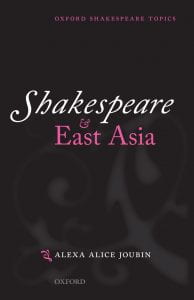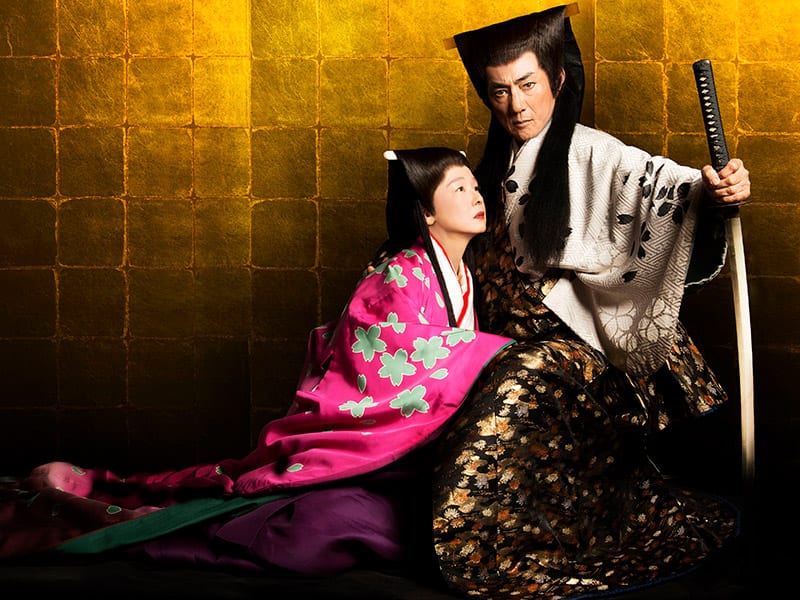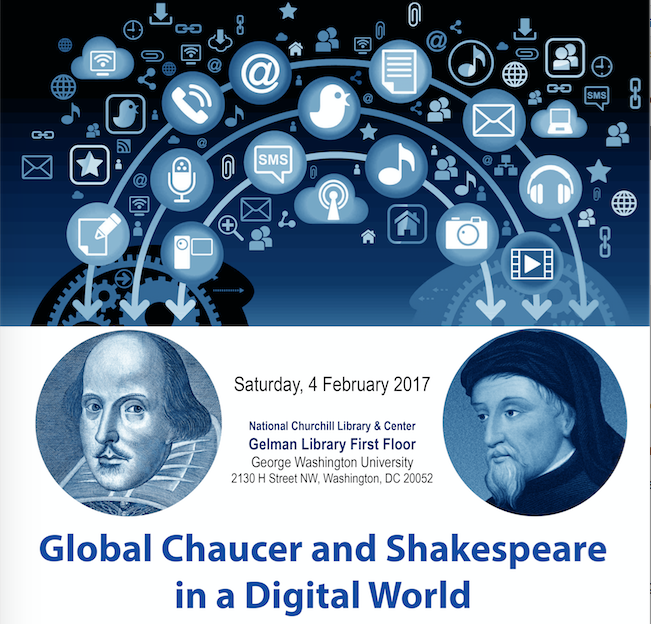Shakespeare and East Asia (2021) explores distinctive themes in post-1950s Asian-themed performances and adaptations of Shakespeare. In this Snapshot, former Fulbright Scholar Alexa Alice Joubin discusses the book and the importance of wider research into Global Shakespeares. ...continue reading "The Value of Global Shakespeare"
Tag: Shakespeare
Five themes in Asian Shakespeare adaptations
Since the nineteenth century, stage and film directors have mounted hundreds of adaptations of Shakespeare drawn on East Asian motifs, and by the late twentieth century, Shakespeare had become one of the most frequently performed playwrights in East Asia. There are five striking themes surrounding cultural, racial, and gender dynamics. Gender roles in the play take on new meanings in translation, and familiar and unfamiliar accents expanded the characters’ racial identities.

In her new book, Shakespeare and East Asia, Alexa Alice Joubin explores five fascinating aspects about Asian adaptations of Shakespeare’s plays.
...continue reading "Five themes in Asian Shakespeare adaptations"
Soviet Shakespeares
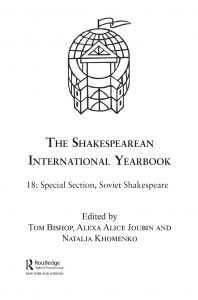
Due to Karl Marx’s frequent references in his political treatises, Shakespeare held a significant place in a number of communist and other left-authoritarian countries, including China and the USSR. And although there were themes in Shakespeare that turned out to be inconvenient for communist ideology, other Shakespearean plays were put into service. In Part I of this volume of the Yearbook, the special section of chapters explores the vicissitudes of artistic and political uses of Shakespeare in Soviet culture and ideology after the October Revolution in 1917, including in some of the continuing resonances of those uses since the collapse of the Soviet Union. And while the real and perceived resistance to prevailing ideologies of Soviet directors has tended to capture recent critical attention, there is a wide range of Soviet and post-Soviet interpretations of Shakespeare. ...continue reading "Soviet Shakespeares"
How Shakespeare Cures a Stuttering King
 The King's Speech (dir. Tom Hooper, 2010) and The Theory of Everything (dir. James Marsh, 2015) deal with figures that suffer from speech impairment. Lines from Shakespeare play an important role in scenes about speech therapy in The King's Speech.
The King's Speech (dir. Tom Hooper, 2010) and The Theory of Everything (dir. James Marsh, 2015) deal with figures that suffer from speech impairment. Lines from Shakespeare play an important role in scenes about speech therapy in The King's Speech.
Having worked with multiple therapists without any result, Bertie (Prince Albert, Duke of York, later King George VI), a stutterer, is reluctant to receive treatment from Lionel Logue. In their first session, Logue bets Bertie a shilling that he can in fact read without stammer right away, and he would record his speech as evidence. Logue puts headphones on Bertie and asks him to read Hamlet’s “to be or not to be” speech into a Silvertone Home Voice Recorder. ...continue reading "How Shakespeare Cures a Stuttering King"
Race and the Epistemologies of Otherness
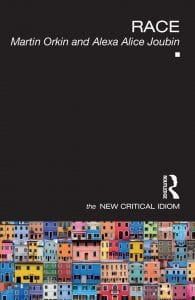 Excerpted from chapter 5 of Race by Martin Orkin and Alexa Alice Joubin. New Critical idiom Sereis. London: Routledge, 2019, pp. 193-227. Full text available online
Excerpted from chapter 5 of Race by Martin Orkin and Alexa Alice Joubin. New Critical idiom Sereis. London: Routledge, 2019, pp. 193-227. Full text available online
When confronted with the unknown, many societies tend to transfer observations of unfamiliar phenomena onto their mental map of what is already known. Race as a category is entangled with empirical knowledge, misinformation, and ideology, all of which seek to justify and sustain particular beliefs. Knowledge about otherness is socially constructed. Knowledge of race results from taxonomical observations made for colonial, medical, bureaucratic, or other purposes such as political movements. ...continue reading "Race and the Epistemologies of Otherness"
“To unpath’d waters, undream’d shores”: Shakespeare in the World
"Voodoo" Macbeth? Heir apparent of the Denmark Corporation in Manhattan (Hamlet 2000)? A pair of star-crossed lovers from feuding families who own competing food stalls in Singapore (Chicken Rice War). In the centuries since William Shakespeare's death, numerous stage and, more recently, film and television adaptations of his work have emerged to inspire, comfort, and provoke audiences in far-flung corners of the globe. As early as 1619, for example, Hamlet was performed in colonial Indonesia to entertain European expatriates. In 1845, U.S. Army officers staged Othello in Corpus Christi, Texas, as a distraction from the run-up to the Mexican-American War. Supported by the National Endowment for the Arts, the Alabama Shakespeare Festival toured its production of Macbeth to several key U.S. military bases in 2004. ...continue reading "“To unpath’d waters, undream’d shores”: Shakespeare in the World"
“Shakespeare and Censorship,” Hay Festival, 2016
...continue reading "“Shakespeare and Censorship,” Hay Festival, 2016"
London Flooded
My research on Shakespeare and intercultural global performances took me to London, where I was working on a book on how diasporic artists approach Shakespeare and how their works are received. One day, I rented a bike and rode along the Thames. One section was flooded due to high tide, and I rode with the ducks.
This section of beautiful Chelsea seems to be flooded often during high tide of the Thames. Ducks swam on the street.
Alternate History, Haider, and Hamlet
“My angel!” A woman’s voice is heard outside a hut in the snow in Kashmir in 1995, a landscape devoid of colors other than mostly black, white, and deep blue. Ghazala’s son, Haider, a lone fighter, is hiding inside the severely damaged hut. Having sustained gun-shot wounds, he is surrounded by the soldiers led by his uncle Khurram who plans to kill him with a shoulder-launch rocket, but Ghazala, caught in between her lover and her son who is intent on avenging his father’s death, convinces Khurram to give her one last chance to persuade Haider to give up his revenge plan and surrender. Soft spoken, Ghazala may not appear to be a particularly strong woman at first glance, but she is taking on the active role of a liaison, negotiator, and now a game changer.
Global Chaucer and Shakespeare in a Digital World
Chaucer and Shakespeare, the global literary icons, play a major role in the digital world. This cross-disciplinary symposium puts the legacies of Chaucer and Shakespeare in conversation with each other. Speakers will explore the intersections and connections between the afterlives of Chaucer and Shakespeare in world cultures.
...continue reading "Global Chaucer and Shakespeare in a Digital World"

